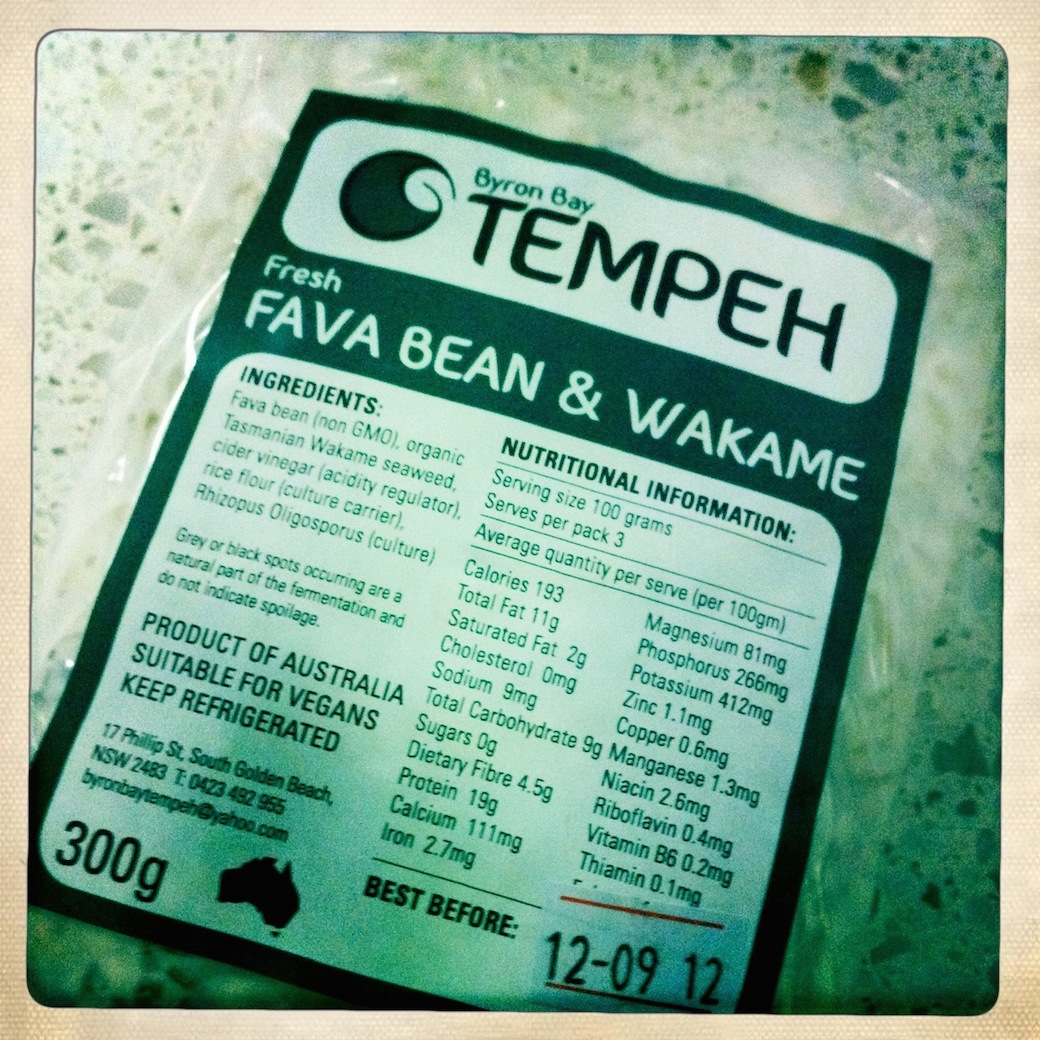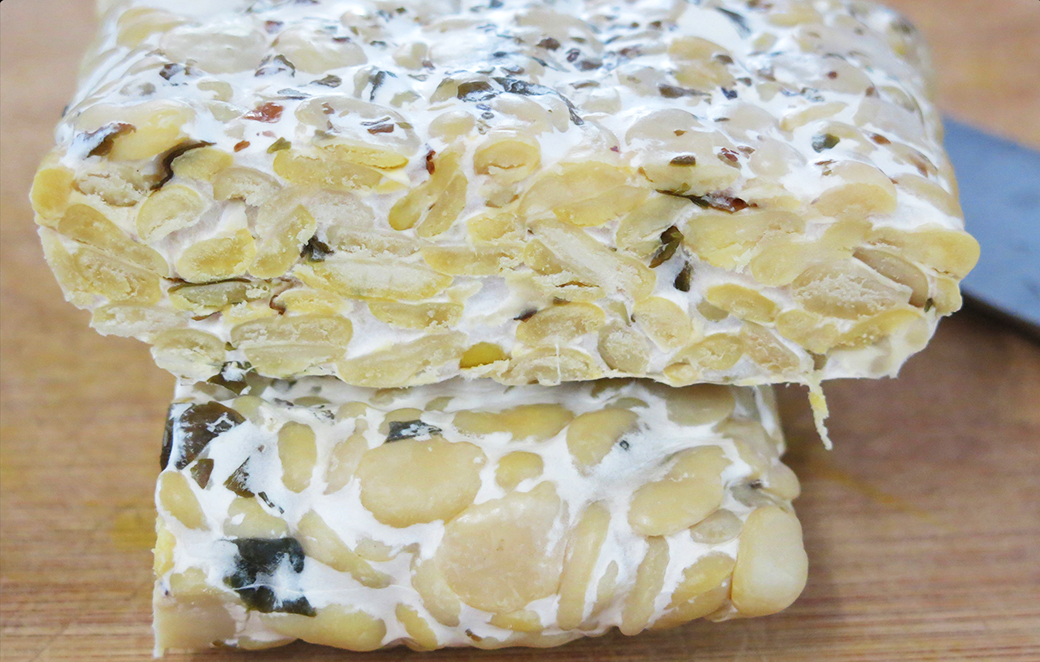When you hear the word tempeh, it is often dismissed as nothing more than a key staple in a stereotypical hippy diet, a meat alternative for wacky vegans who seek to get their protein from beans and legumes as opposed to meat. I am pleased to say however, that long gone are the days of rubbery vegan food and tasteless, bland meat alternatives. Tempeh is making a comeback, in brand new and exciting ways. Veering away from the soy industry, soy-free tempeh is now making an appearance in health food stores and supermarkets around the country. While tofu may still be getting a bad wrap, tempeh has emerged as a leading source of plant-based protein and its unique health benefits are becoming more commonly known. No longer reserved for the non-meat eating crowd, tempeh is being eagerly embraced and enjoyed by all walks of life.
Byron Bay Tempeh appeared at the local Byron Farmers Markets around two years ago, pioneered by Sarah Bernard who saw the potential of introducing a plant-based protein into the market. Having relocated to South Golden Beach from Lismore, Sarah began working at a friends market stall. Enjoying the direct interaction with the local community, she began to think about what product she could possibly bring to the table.

Having been vegetarian since she was eighteen years old, Sarah had been working at 20,000 Cows – a vegan restaurant in Lismore, where she became close friends with Murray, the owner of this Northern Rivers institution. “We moved to Lismore from Cairns and did the Byron thing for a while – working odd jobs, playing music, working in hospitality,” Sarah explains, “there was a vegan ashram I guess you would call it at the end of the street where we lived, so I started helping out there.”
“Murray turned vegan when his children were young and taught himself how to make tempeh from scratch,” Sara explained, “his tempeh culture is over 30 years old!” It was Murray’s enthusiasm for his tempeh that stayed in Sarah’s mind as she began to ponder ideas for her own market stall.
“I proposed the idea to the market manager and she loved it, I was worried because I knew I wouldn’t be growing the beans myself, but she loved the prospect of having a vegetarian protein on offer. She asked if I knew how to make tempeh and of course I said yes, even though I didn’t!” Sarah, full of excitement, called Murray and asked if he could teach her his age-old recipe for tempeh and he agreed.
“The day I spent training with Murray was overwhelming!’ Sarah recalls with a laugh, “He is a trained scientist, a microbiologist, and tempeh is a living culture, it involves science- pH levels, exact temperatures, incubation – it was a little more than I had first imagined”
Yet remaining undeterred by the science behind the product, Sarah returned home to make her first batch. “I was set on using fava beans instead of soy and Murray had his doubts! I began in a small cupboard with a little fan and heater; they were like my little babies!” Sarah laughs as she recalls her first trial. Yet after 40 hours of incubation time, without sleep and with bated breath, Sarah was thrilled to admit her experiment was a success. ‘That was the mojo that I needed to begin.”

Sarah admits there have been many failed batches since that first initial success and the whole process has been a huge learning curve for her, yet the tempeh has taken on a life of its own so to speak, and its popularity and success continue to grow at a rapid rate.
“The expansion has happened very organically,” Sarah explains. After one rainy day market in Mullum, Sarah decided to pop by the local Santos store and ask if they would like to sample the product. Of course, they loved it and from there, local distribution moved swiftly. The tempeh is also distributed up the east coast with Peace Love and Vegetables, as well as down south in areas of Melbourne. With Byron existing as such a popular destination for tourists, many travellers that have tried Sarah’s tempeh have encouraged local health food shops in their hometowns to stock the product.“This is one of the benefits of the markets,” Sarah explains, “We are able to get that direct feedback and interaction with our customers.”
While Sarah admits to not being anti-soy, her desire to use fava bean and later chickpeas for her tempeh came about from her intention to offer her family a soy free source of protein. “We were already consuming quite a bit of soy in our diet and that didn’t feel quite right, so I wanted to avoid creating another soy product. I really liked the idea of using fava beans and chickpeas, and this difference has proven to be its greatest selling point!” Sarah is proud to state that the tempeh is lovingly hand made using the best quality Australian ingredients. ‘The chickpeas, apple cider vinegar and Tasmanian wakame seaweed we use are all certified organic and all of the ingredients are non GMO.”
Sarah recently had the tempeh analyzed in Melbourne and was thrilled to learn that the tempeh did indeed have good levels of B12, iron, calcium, magnesium and a host of other beneficial minerals. “It is one of the only known vegetarian sources of B12 on the market.” Sarah explains, ‘as well as being an excellent source of protein and probiotics due to its fermentation process.”

Sarah’s tempeh also ticks another box in terms of its sustainability and minimal impact on the planet – all of the 20kg sacks from the beans are used by two local artisans to make durable market bags, while any plastic offcuts from the wrappers are used as the stuffing in foot pouffes that are also sold at the local weekend markets. “Customers love it when we tell them that they are full of rubbish!” Sarah laughs, “Its called ‘Up-cycling,’ the idea of being able to give something a longer life before hitting the landfill.”
Despite the expansion of Byron Bay Tempeh, Sarah still makes every batch by hand. “Every single bean passes through my hands,” Sarah proclaims proudly, “I don’t have anyone else making it for me. It’s a secret recipe and it is certainly made with lots of love.”
When asked what the next step is for the business Sarah says she would like to find more of a balance between work and family life, “Its pretty much been two years head down in the kitchen,” she explains. Nevertheless, she is also keen to develop a third flavour “I would really like to use brown rice,” she adds, “so I’m looking forward to experimenting with that.”
You can find Sarah and Byron Bay Tempeh at the local Farmers Markets on Tuesdays, Thursdays and Fridays. Look out for her tempeh in the refrigerated section in health food stores across the country.
Stay up to date with their new on their Facebook Page or jump over to their website to contact them directly at www.byronbaytempeh.com
Still unsure what to do with tempeh? Hop on over to Bella and Bhakti and try the delicious recipe for Raw Pad Thai with Byron Bay’s Chickpea Tempeh.
